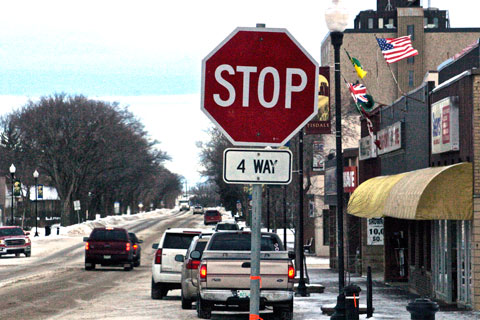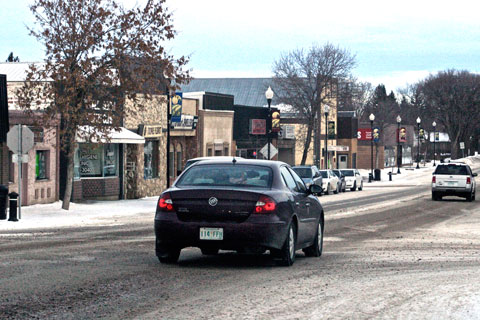
.
Canadian economy 911 call
.
January 24, 2015
Tisdale
by: Timothy W. Shire
Tisdale
by: Timothy W. Shire
.
If we were squirrels our lives would be much easier. Squirrels have most things under control. The rely upon their experience, their senses and with that set of information, they establish a plan of action. Humans don’t really do things that way.
We, for a variety of reasons, disregard our senses and the information that is available to us, we also seem to distrust what we have learned in our lives up until now and we almost always make our decisions based on what others tell us they are going to do, or we act as best we can to conform with our peers. Seems a bit confusing, but that’s what we do.
If a squirrel is hungry and he can see, smell, or hear no immediate threat, he will dash off to the nearest squirrel fast food location to deal with his hunger. However, a human will first wonder if the hunger is real, or imagined, then consider if their diet will allow them to eat, once these factors are determined, a human will then consult with his, or her experience, to make sure that his, or her behaviour is appropriate, with these factors sorted out, the decision to go find something to eat will be determined if he, or she, has not received information that does not conflict with solving the hunger problem. Sometimes, I am amazed to see that most people are not starving to death.
 The reason I am explaining this to you is that were we squirrels we would act much more directly and give much less thought to the consequences.
The reason I am explaining this to you is that were we squirrels we would act much more directly and give much less thought to the consequences.
This past two weeks, we have seen some serious confusion coming from the Dominion’s capital. The government has decided not to table a budget, well at least until the economic instability is sorted out, which quite simply means, no budget. The second factor to come along, is the Bank of Canada, has dropped the interest rate from a meagre 1% to 3/4 of a %. Not only that, the uncertainty expressed by the governor of the Bank of Canada was astonishing. Put these two things together and you have an all out emergency.
The purpose of this posting is not to inform you about squirrels, but to get into your economic life jacket. Canadians, be advised we are in trouble.
The very worst condition for an economy is for investors to be anxious and right now, that is all we have to offer them. The decisions about buying and selling stock, or commodities, is based entirely on “gut” reactions. There is no crystal ball, or magic formula, investors function at the squirrel level and things do not look good.
Each night, the pundits come on the national news and the financial programs like Amanda Lang’s Exchange and try to make sense out of the conditions that are being outlined in the news. They have discuss the ramifications of low oil prices and how oil makes up only 15% of the Canadian economy and that low fuel prices might stimulate the economy, they talk about the 80¢ dollar as being an incentive for re-employment of Ontario workers and the hardship to Alberta and Maritime workers in Alberta. These discussions are helpful and informative, but there is much more happening and you really need to think this through.
Banks and investment counsellors are warning consumers to lay off on borrowing money at these low interest rates, noting that we Canadians are now holding 168% debt, in relation to Canada’s GDP. At the same time, with virtually no interest accruing to savings, what is the point in putting money away, money that each day is declining in value as the loonie just keeps falling and falling. Does it make sense to pay down your debt, when you consider that if you wait, that debt will be worth less, as time goes by. By all means, get rid of your 24% credit card debt, but bank debt and mortgage debt really seems to make no sense to retire it quickly.

There are some other factors that we need to consider; When you buy anything, no matter what it is, does it come from Canada? You know as well as I, that Canada produces raw materials and only 14% of automobiles sold in this country. Almost all of our food, with the exception of bread and milk, is imported. Your money is now worth 20% less than a couple of years ago and it is falling. The price of everything is going up, away up and the greatest increase is going to be at the food check-out counter.
Our pickles come from India, our canned peaches from China, almost all of the fish in supermarkets comes from China, or southeast Asia, our meat is exported and as a result it is floating to the price of the American dollar, which means it is going to keep on going up, your clothing, household goods, almost everything you can think of, is imported. We are in trouble.
The expected improvement in manufacturing in Ontario, caused by the low value of the dollar, will not kick in for more than two years and I would suggest to you, that even then, it is not going to happen. Kelloggs, Heinz, Caterpillar, GM, have all said goodbye to Canada and no new employers are showing up.
Finance minister Joe Oliver and the governor of the Bank of Canada might just as well have stepped up to their respective press conferences with a flare gun in their hands and shot one into the ceiling, because they offered no one a hint of confidence in the Canadian economy. Without hope, is defined as “hopeless.” That’s the message they have sent, and we are all going to have to live with the consequences.
 We are entering a depression, not a recession in our economy, all of the experts are expecting rapid increase in unemployment and unlike other recessions in the decades past, Canadian workers now no longer have the safety net of what is interestingly referred to as “employment insurance.” The government has messed with what once set us apart from other impoverished countries, the unemployment insurance program, so much that it is no longer functional. Few workers will qualify and it is a patchwork of benefits spectacularly diverse across the country.
We are entering a depression, not a recession in our economy, all of the experts are expecting rapid increase in unemployment and unlike other recessions in the decades past, Canadian workers now no longer have the safety net of what is interestingly referred to as “employment insurance.” The government has messed with what once set us apart from other impoverished countries, the unemployment insurance program, so much that it is no longer functional. Few workers will qualify and it is a patchwork of benefits spectacularly diverse across the country.
This morning I heard a cabinet minister eloquently praising the government’s creation of more than a million jobs since 2008, which is a full twelve years ago, which adds up to something of about 112,000 new jobs a year. Hardly something to be proud of, when you realise that most jobs are part time and entry level jobs, while jobs losses over the same period of time have kept the unemployment rate at above 7% year after year. Among those under 26 years old, the employment rate is staggering and in the aboriginal population about 80%. But, to make things even more confusing, Stats Canada’s ability to collect meaningful data, is all but a myth, because of cuts to its budget and thee removal of vital data that would have kept us informed. No employment data is even collected for First Nations people, Stats Canada says it is to expense to do that.
Here is what we are looking at:
The Question is, what should you do?
There are several things you need to do right away:

We, for a variety of reasons, disregard our senses and the information that is available to us, we also seem to distrust what we have learned in our lives up until now and we almost always make our decisions based on what others tell us they are going to do, or we act as best we can to conform with our peers. Seems a bit confusing, but that’s what we do.
If a squirrel is hungry and he can see, smell, or hear no immediate threat, he will dash off to the nearest squirrel fast food location to deal with his hunger. However, a human will first wonder if the hunger is real, or imagined, then consider if their diet will allow them to eat, once these factors are determined, a human will then consult with his, or her experience, to make sure that his, or her behaviour is appropriate, with these factors sorted out, the decision to go find something to eat will be determined if he, or she, has not received information that does not conflict with solving the hunger problem. Sometimes, I am amazed to see that most people are not starving to death.

This past two weeks, we have seen some serious confusion coming from the Dominion’s capital. The government has decided not to table a budget, well at least until the economic instability is sorted out, which quite simply means, no budget. The second factor to come along, is the Bank of Canada, has dropped the interest rate from a meagre 1% to 3/4 of a %. Not only that, the uncertainty expressed by the governor of the Bank of Canada was astonishing. Put these two things together and you have an all out emergency.
The purpose of this posting is not to inform you about squirrels, but to get into your economic life jacket. Canadians, be advised we are in trouble.
The very worst condition for an economy is for investors to be anxious and right now, that is all we have to offer them. The decisions about buying and selling stock, or commodities, is based entirely on “gut” reactions. There is no crystal ball, or magic formula, investors function at the squirrel level and things do not look good.
Each night, the pundits come on the national news and the financial programs like Amanda Lang’s Exchange and try to make sense out of the conditions that are being outlined in the news. They have discuss the ramifications of low oil prices and how oil makes up only 15% of the Canadian economy and that low fuel prices might stimulate the economy, they talk about the 80¢ dollar as being an incentive for re-employment of Ontario workers and the hardship to Alberta and Maritime workers in Alberta. These discussions are helpful and informative, but there is much more happening and you really need to think this through.
Banks and investment counsellors are warning consumers to lay off on borrowing money at these low interest rates, noting that we Canadians are now holding 168% debt, in relation to Canada’s GDP. At the same time, with virtually no interest accruing to savings, what is the point in putting money away, money that each day is declining in value as the loonie just keeps falling and falling. Does it make sense to pay down your debt, when you consider that if you wait, that debt will be worth less, as time goes by. By all means, get rid of your 24% credit card debt, but bank debt and mortgage debt really seems to make no sense to retire it quickly.

There are some other factors that we need to consider; When you buy anything, no matter what it is, does it come from Canada? You know as well as I, that Canada produces raw materials and only 14% of automobiles sold in this country. Almost all of our food, with the exception of bread and milk, is imported. Your money is now worth 20% less than a couple of years ago and it is falling. The price of everything is going up, away up and the greatest increase is going to be at the food check-out counter.
Our pickles come from India, our canned peaches from China, almost all of the fish in supermarkets comes from China, or southeast Asia, our meat is exported and as a result it is floating to the price of the American dollar, which means it is going to keep on going up, your clothing, household goods, almost everything you can think of, is imported. We are in trouble.
The expected improvement in manufacturing in Ontario, caused by the low value of the dollar, will not kick in for more than two years and I would suggest to you, that even then, it is not going to happen. Kelloggs, Heinz, Caterpillar, GM, have all said goodbye to Canada and no new employers are showing up.
Finance minister Joe Oliver and the governor of the Bank of Canada might just as well have stepped up to their respective press conferences with a flare gun in their hands and shot one into the ceiling, because they offered no one a hint of confidence in the Canadian economy. Without hope, is defined as “hopeless.” That’s the message they have sent, and we are all going to have to live with the consequences.

This morning I heard a cabinet minister eloquently praising the government’s creation of more than a million jobs since 2008, which is a full twelve years ago, which adds up to something of about 112,000 new jobs a year. Hardly something to be proud of, when you realise that most jobs are part time and entry level jobs, while jobs losses over the same period of time have kept the unemployment rate at above 7% year after year. Among those under 26 years old, the employment rate is staggering and in the aboriginal population about 80%. But, to make things even more confusing, Stats Canada’s ability to collect meaningful data, is all but a myth, because of cuts to its budget and thee removal of vital data that would have kept us informed. No employment data is even collected for First Nations people, Stats Canada says it is to expense to do that.
Here is what we are looking at:
- Government services in Alberta and Saskatchewan are going to take a hit because of reduced oil revenue.
- Federal government services are going to be even further reduced because of the government’s tax cuts to the wealthy and attempts to balance a budget that can not be balanced.
- Unemployment will rise right across the country. Oddly enough layoffs will continue in Ontario, but the Maritimes will be hardest hit.
- The price of food and all goods will rise over the next six months by about 15%.
- Property taxes have already risen, but expect income tax provincially to rise and sales taxes in most provinces will increase, as has already happened in Manitoba.
- Inflation was announced yesterday at only 1.4% heading toward deflation, because of the drop in gasoline prices by 50%. New car prices will increase with the rise in everything else, but that index may stay stable because of the way the data is collected and weighted.
- With unemployment rising, the housing market will take a modest hit, as people out of work will have to sell and rent will go up because of the demand for rental accommodation.
- At this point the stock market is remaining unreasonably high because the US economy is showing growth. However, this marketplace is completely unpredictable.
The Question is, what should you do?
There are several things you need to do right away:
- Move all credit card debt from your cards to line of credit, or bank loans.
- Even though there is no interest available for savings, scrape together as much money as you can, so you have something to rely upon if you are laid off from work.
- Take your saving,s and money you are about to save, and purchase American dollars, or Euros, both will gain far more value than interest in a savings account.
- Do not buy stock in anything.
- Come spring plant a garden, a big garden.
